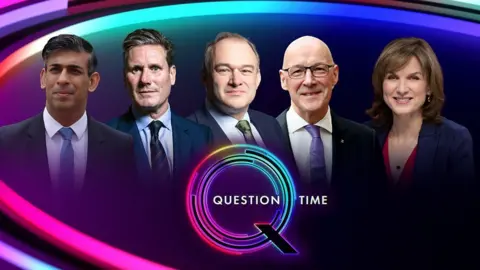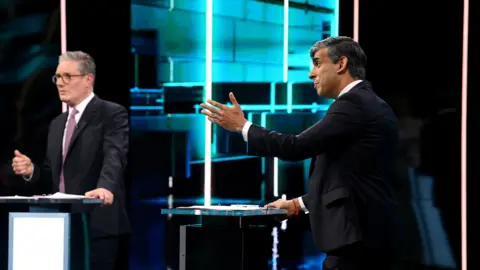ARTICLE AD BOX
14 minutes ago
By Henry Zeffman, Chief political correspondent

 BBC
BBC
There are only two weeks to go until polling day. Which means the stakes for tonight’s Question Time leaders' special are enormous.
Each of the four leaders taking part will have their own particular goals and a distinctive strategy for achieving them. We can’t predict what questions they will face.
But here’s something you can be sure to expect: big, eye-popping numbers repeated again and again, and once more for good measure.
Of course it’s hardly unusual for political parties to spend election campaigns throwing around big numbers. But it’s still been striking over the past month how persistently the biggest parties in particular have stuck to contested figures, even under frenzied challenge.
In the first debate of the campaign just over a fortnight ago, the number of the night was £2,000. Rishi Sunak managed to answer almost every question - even one about his national service plan - by accusing Labour of preparing to drop a £2,000 tax bill on households across the country.
Tactically, the repetition worked. It allowed the prime minister to grab hold of the debate, helped - as the Labour campaign privately concede - by Sir Keir Starmer’s failure to rapidly challenge Mr Sunak on the figure.
It was the prelude to what has become the theme of the Conservative campaign so far: tax. Chalk that one up as a Sunak success.
Just one hitch. The figure wasn’t accurate. At least not in the way Mr Sunak - and subsequently almost all of his representatives on the airwaves - presented it.

 ITV/PA
ITV/PA
Rishi Sunak and Keir Starmer squared up in an ITV election debate, but will be put on the spot this time by a Question Time audience
The Conservatives took the amount of spending they claim Labour haven’t accounted for and divided it equally between the number of working households - an undeniably crude method.
And they attributed the calculation to “independent Treasury officials”. True up to a point. But some of the calculations didn’t come from the Treasury and those that did relied upon assumptions provided by Conservative political advisers.
Separately the UK’s statistics regulator took issue with the implication that the £2,000 would all fall in one year. Actually the Conservative claim is that it would fall over four years, so about £500 a year. You can read much more from BBC Verify examining all of that here.

 .
.
Labour face questions of their own over their use of statistics. They argue that the Conservatives’ plans would put £4,800 on homeowners’ mortgages. That’s about as accurate as the Conservatives’ £2,000 claim - which is to say, not very.
It’s based on a dossier Labour have compiled of what they call the Conservative Party’s “wish list of unfunded promises”. Firstly, it commits exactly the same sin deplored by the statistics regulator, rolling multiple years’ worth of figures into one large sum.
It ignores fixed-rate mortgage holders. It assumes that any shortfall in the Conservative plans would be funded solely by borrowing. And it assumes, perhaps most controversially, that while the Conservatives say they would save £12bn a year from welfare spending, they would in fact save absolutely nothing at all.
At the risk of sucking you into an infinite vortex of inaccuracy, it’s true that the Conservative £12bn figure is itself very questionable - but it seems even more questionable to suppose there is nothing at all they could cut from the welfare budget.
Is it just Labour and the Conservatives willing to gloss over such details to come up with eye-catching claims? Of course not. Reform UK has pledged to eliminate £50bn of government waste as part of a package which the independent Institute for Fiscal Studies said simply does not “add up”, even if you accept their “extremely optimistic assumptions” about future growth.
The Greens say they can raise £91.3bn a year from carbon taxes, following a plan which experts say has far from sufficient detail.
The Liberal Democrats say their promise of free personal care for older and disabled people will be funded by taxes on the “big banks” and billionaires, but whether this will raise enough to cover the pledge is questionable.
'Second thoughts'
In other words there’s plenty to unpick in lots of what the campaigns have said. But the parties know this and still they believe it’s worth it for them. Why?
Ask Michael Gove. The levelling up secretary, who stood down from Parliament when the election was called, visited Conservative headquarters earlier this week to give a morale-boosting speech to those working on the campaign. He said the debates over the £2,000 figure’s accuracy had only boosted its salience, likening it to the furious row overVote Leave’s claim in 2016 that Brexit would mean £350 million more a week being spent on the NHS.
Anecdotally, Conservative candidates say there is some evidence that Mr Gove is right, especially in more affluent parts of the country. “It’s working really well in the Home Counties,” one minister told me. “It’s definitely prompting some second thoughts for people considering voting Lib Dem because they’re not that worried about a Labour government.
“But in the north it’s not working so well with switchers to Labour or Reform.”
Labour insiders say there is little evidence that the Conservatives’ focus on tax is harming them. But it was apparent that they feared it might from the speed with which Labour officials raced to counter the attack after that first debate.
And just like the Conservatives, Labour’s own contested claims are designed to amplify their core message - in their case that Liz Truss wrecked the economy and that a full term of Rishi Sunak would do the same.
If the directness of Starmer’s approach causes unease among some in Labour, they can’t say they weren’t warned. Fourteen months ago the Labour leader stood solidly behind controversial adverts claiming Mr Sunak did not think adults who had sexually assaulted children should go to prison.
At the time a senior party insider told me the adverts had been a “triumph”, forcing the Conservatives to “talk about what we want to talk about.”
As they enter the final fortnight, that’s what all the campaigns want. Whatever the factchecks, whatever economists say, they want the centre of gravity of the whole campaign to be on their terrain.
Whether all this corrodes public trust in politicians and what they say - well that’s a question for another day.

 6 months ago
24
6 months ago
24








 English (US) ·
English (US) ·